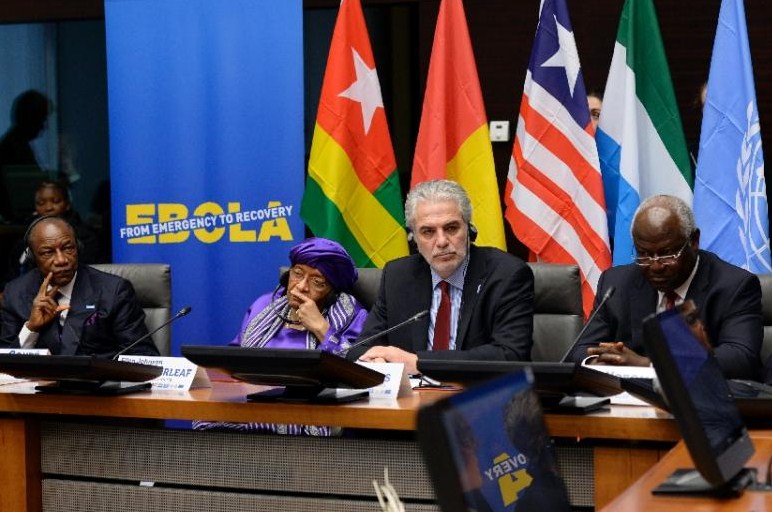African leaders call for Ebola ‘Marshall Plan’

By Jibril Ture
During a European Union-backed conference in Brussels on Tuesday, the heads of state from the West African countries hardest-hit by the Ebola epidemic called for a Marshal Plan to recover from the dire economic consequences of the crisis on their countries.
“The impact of Ebola on our economies has been profound,” Liberian president, Ellen Johnson Sirleaf, told the international audience on Tuesday. The Liberian head of state, who only last week met with President Obama at the White House, after meeting with U.S. Secretary of State John Kerry to thank the American people and their government for their help during the epidemic, added: “The most important long-term response to Ebola therefore rests in plans and strategies for economic recovery.” Sirleaf went as far as remarking that “this will require significant resources, even a Marshall Plan,” the U.S. aid package that helped Europe rebuild after the devastation of World War II.
Leaders from the two other West African countries affected by the epidemic, President Alpha Conde of Guinea, and Ernest Bai Koroma of Siera Leone, were also in attendance. President Conde, echoing the sentiment expressed by his Liberian counterpart, stated in a news conference that the region is indeed “coming out of a war,” with the healthcare sectors seriously damaged, forcing authorities to divert resources from pre-existing health concerns such as malaria, AIDS, measles and other diseases to fight Ebola.
According to the World Bank’s estimates, the countries hardest-hit by the Ebola outbreak are forecast to lose 12 percent of their combined domestic product this year. Just as the international community contributed significantly to fighting the epidemic, more good news came from Washington Monday when the International Monetary Fund approved a major debt relief of about $187 million for Sierra Leone for coming years. $85 million of that amount is expected to be disbursed immediately. Besides the leaders from the three West African nations, lead participants at the Brussels conference including delegates from the European Union, the United States, the United Nations, Australia, Cuba and international organizations including the World Bank and the International Monetary Fund and the World Health Organization.
At the conclusion of the conference, the leaders renewed their commitment to “maintaining international engagement with the recovery and development process in the Ebola affected countries,” while the African leaders repeated their pledge to eradicate the disease by mid-April.
According to the World Health Organization nearly 24,000 people have so far been infected with the Ebola virus, with a little under 10,000 deaths since the epidemic’s outbreak in December 2013 in Guinea. Late last year, at the peak of the epidemic, Liberia, Sierra Leone and Guinea saw about 900 new cases a week. But, thanks to the assistance of the international community, the crisis has been largely brought under control. The images of Liberia school children returning to school last month gave a measure of the improvement.
The United States has allocated $2.5 billion to Liberia alone to help fight and recover from Ebola, and has played a supportive role in securing financial support from IMF and World Bank. President Obama has sent 3,000 troops to Liberia to train nurses and provide other assistance to deal with the epidemic.
David Nabarro, U.N. Ebola envoy, said on Monday that the number of new cases has decreased from 900 to 100 a week, although he warned that new cases are being reported in Sierra Leone and Guinea. “We must guard against complacency. There will not be total victory until we get to zero cases,” said Sierra Leone’s president Ernest Bai Koroma, a view shared by other leades in Brussels Tuesday, after U.S. leaders did so in meetings with President Sirleaf last week in Washington. The statement issued following the just-concluded conference in Brussels made it clear that the eradication of the epidemic “will require continued political engagement, a sustained level of funding and the constant mobilisation of technical staff and specialized assets.”


